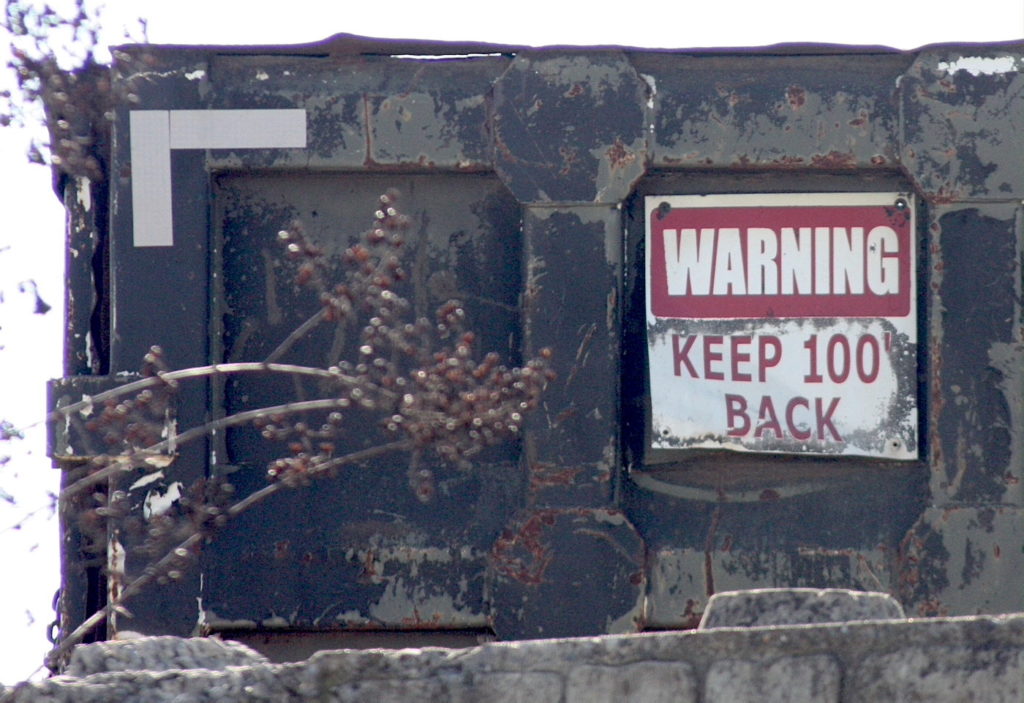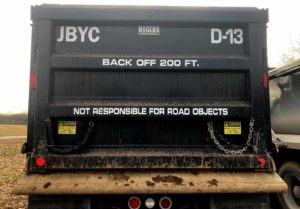
There’s no stress like that of driving behind a dump truck — especially if the grimy vehicle boasts signs like “Keep back 100 feet” and “Not responsible for any damage.”
So you grip the steering wheel extra tight and try to keep back. You might pray that some pesky piece of gravel doesn’t bounce from the truck and damage your windshield.
“It seems like I got hit by three or four different things in the course of a week,” says Alan Powell, who commutes a lot and drives as part of his job, “and each one of them started a new crack in my truck’s windshield.”
Powell has dealt with his fair share of windshield cracks on his personal vehicle, his work truck and even a rental car. He says he tries to maintain the recommended distance behind dump trucks but that the flow of traffic often makes this impossible.
“If it’s happening this much to me, it’s surely happening to other people with some frequency,” he says.
Frustrated, he came to Curious Nashville with a question:
Are dump trucks liable for damage caused by the objects that they inadvertently release onto roadways?
With a bit of exploring, it’s clear there are more layers than what the simple signage promotes from the back of those trucks. And there isn’t one universal following distance — you might see warnings recommending 100, 200, or even 300 feet.
And once you start noticing, you might not be able to stop.
The liability issue
There’s pretty wide consensus about liability.
Dump trucks are not liable for damages if the cargo first hits the ground and then another car. At that point, the debris is a roadway hazard and no longer an issue of securement on the part of the driver.
And dump trucks are not liable if debris that is already on the road is kicked up by their tires or mud flaps.
 Tony Gonzalez WPLN News
Tony Gonzalez WPLN NewsLiability questions aside, keeping back is a helpful rule of thumb.
The only case in which dump trucks are liable is if cargo that they are carrying is released and strikes another vehicle without first hitting the ground.
Then, it is the dump truck driver’s fault for not properly securing his or her load. All truck drivers must follow federal, state and company regulations for securing cargo.
“In general, those signs that say ‘keep back 100 feet’ on dump trucks, they’re just signs,” says Isaac Kimes, a Nashville attorney who specializes in civil litigation. “They have the appearance of avoiding or waiving legal responsibility, but they are just signs.”
The signs are there to encourage motorists to maintain a distance from dump trucks. This also helps to ensure that most released debris would become roadway hazards — meaning the trucks wouldn’t be liable.
All open bed trucks must follow Tennessee Code Annotated 55-7-109, which regulates that loose material must be at least four inches below the sides of the truck.
“Any sign cannot absolve a wrongdoer of that requirement,” Kimes says.
Advice for drivers
If your windshield was cracked and you believe that a dump truck is liable, pursuing legal action can be difficult.
Try to take down the truck’s information: company name, license plate number or the truck owner’s name (which is required to be displayed on the back of the vehicle).
Your insurance company might need this information. This way, the company can collect from the party that caused the damage.
“The main advice that I have for drivers out there is to check your insurance policy and see what kind of coverage you have, see what kind of deductible you have and see what your policy covers,” Kimes says.
Even plans described as “full coverage” might have low limits or high deductibles.
The deeper damage
For Powell, the issue is greater than a crack in the glass.
“It’s more than just my windshield got hit by this piece of debris … I think it goes beyond that, when we start to ask ourselves, why do we allow this to be the way that we operate?” he says.
Powell wants companies, and adults in general, to take ownership of their mistakes and to rectify bad situations. He references the virtues instilled in him as a child by his mother and grandmother.
“If you make a mess, you clean it up. If you cause a problem, you take responsibility. I just feel like that should carry forward into our adult lives,” Powell says. “We’ve got these two tracks that we’re all running on at the same time, all the time: What is legal? And does legal mean moral? Clearly, it doesn’t.”
Josey Beavers is a junior at Harpeth Hall. She completed this report while job shadowing at WPLN News.


